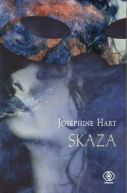

Sin, like Josephine Hart's third novel The Stillest Day, is an explicitly cautionary tale. Ruth Ashbridge is, from childhood, obsessively jealous of her orphaned cousin Elizabeth. At first, her envy leads her into only minor misbehaviour--adopting her smile, stealing her jewellery and silk underwear. Yet these small thefts quickly escalate into major transgressions as Ruth sets about stealing Elizabeth's husband and her happiness.The confessional nature of Hart's first-person narrative suits the outpouring of hatred and envy. Ruth's position is succinctly summed up: "Like Satan before the Fall, I came to hate the very nature of goodness, to fear its power." However, her emotion is occasionally overemphasised and the descriptions of her overwrought, resulting in Ruth sounding unintentionally comic. She says of her own marriage to Dominick: "We were balanced. His love. My coldness."With Sin, Josephine Hart aims to create a modern biblical parable. In order to foreground the didactic content of her novel, Hart keeps characterisation to a minimum, shunning the complex psychology and narrative tension of her first novel Damage. In Hart's world, sin--succumbing to an impulse in complete disregard of its consequences--leads inescapably to tragedy. Through that tragedy, the heroine will learn too late the true value of goodness. --Vanessa Cook
więcej
Informacje dodatkowe o Sin:
Wydawnictwo: Vintage Books
Data wydania: b.d
Kategoria: Literatura piękna
ISBN:
Liczba stron: 0
Kup książkę Sin
Sprawdzam ceny dla ciebie ...
Cytaty z książki
REKLAMA
Zobacz także
Sin - opinie o książce
Inne książki autora
Skaza
0
Statecznego na pozór Stephena Fleminga - głowę rodziny, doświadczonego lekarza i dobrze zapowiadającego się polityka - dręczy poczucie pustki. Antidotum...
Oblivion
Zobacz wszystkie książki tego autora
0
Laura Bolton is dead, but she will not go away. Her mother keeps a shrine to her memory, and her husband, Andrew, is haunted by her presence even when...

















Chcę przeczytać,